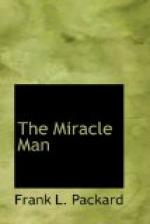Madison took the slate.
“But if these thousands of others came to you—what then?”
The Patriarch’s face glowed.
“It would be a wondrous joy,” he wrote. “Too wondrous to dwell upon—because it could never be. If they came I could help them, for their very coming would be an evidence of faith—and faith alone is necessary. Think of the joy of helping so many others—it is the fulness of life. But let us not dream any more, friend Madison.”
“Of course,” communed Madison, studying the illumined face, “he’s slightly touched in his upper story on the faith stunt; but he’s in dead earnest, and he’s got the brotherhood-of-man bug bad. Come to think of it, Hiram did say something about his ‘sight failing,’ but I didn’t think it was anything like this. If he’s going to go finally blind in, say, a week, perhaps it would be just as well to postpone the opening night until he does.”
Madison took the slate.
“Stranger things than that have happened,” he wrote. “I never heard of you before, yet I am one of the thousands beyond this little town and I am here—why not the others?”
The Patriarch shook his head sadly.
“It is but a dream,” he wrote.
Madison held the slate in his hands for quite a long time before he wrote again; his attitude one of sympathetic hesitancy as his eyes played over the form and face before him, while the Patriarch smiled at him with gentle, patient resignation. Back in Madison’s fertile brain the germ of an inspiration was developing into fuller life.
“What will you do here alone when you are blind?” he asked—and his face was disturbed and solicitous as he passed the Patriarch the slate.
“I need very little,” the Patriarch wrote back. “You must not worry about me. My garden supplies nearly all my wants, and there are many in the village, I am sure, who will help me with that when the snow is gone.”
“I am quite certain of that,” Madison’s pencil agreed. “But here in the house you cannot be alone—there are so many things to do, little things that I am sure you have not thought of—some one must cook for you, for instance. You will need a woman’s hand here—have you no one, no relative that you can call upon?”
The Patriarch lowered the slate from his eyes, shook his head a little pathetically, and began to write.
“I do not think they would have cared to come, even if they were still alive; but they are all gone many years ago—except perhaps a grand-niece, and I do not know what has become of her.”
“Why, that’s just the thing,” wrote Madison. “Suppose we try to find her?”
Again the Patriarch shook his head.
“I am afraid that would be impossible. I do not even know that she is alive. I know only of her birth, and that is twenty years ago.”
“Even that is not hopeless,” wrote Madison optimistically, and his face as he looked at the Patriarch was seriously thoughtful. “Where was she born?”




